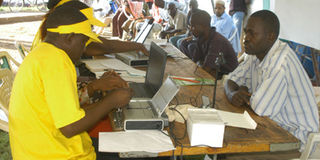Breaking News: Old Kijabe dam tragedy: Death toll rises to 40
Will Kenya be ready to go for elections in 12 months?

IIEC clerks register voters at the start of the voter registration exercise at the Aga-Khan hall in Kisumu April 12, 2010. Questions are being raised over whether the country will be ready for general elections 12 months from now.. Photo/FILE
Questions are being raised over whether the country will be ready for general elections 12 months from now.
The Charles Nyachae-led team in charge of implementation of the new Constitution has said the next elections must be held on August 14 next year in line with Article 101 of the Constitution.
Dissolved in May
To comply with the deadline, Parliament would have to be dissolved in May 2012.
But will this be possible given the pending electoral laws yet to be passed by Parliament as well as the establishment of a body to manage elections?
The appointment of the Independent Electoral and Boundaries Commission is probably the first hurdle that will need to be overcome. The panel that will appoint the commission has already been approved by Parliament.
However, given the elaborate process to be used in appointing commissioners, it will take two months or more to have it in place.
This takes into account the application period, expected high number of applicants, lengthy interviews and parliamentary vetting before eventual appointment.
Though the law spells out the appointment process, various political, regional, gender and ethnic interests are likely to play out.
And if the IEBC is appointed, say in October, it will only have six months before the May dissolution of Parliament.
The Independent Electoral and Boundaries Commission Act requires the team to use the first four months to complete the emotive boundary review started by the Andrew Ligale group.
It is within the remaining period that the commission is required to complete the review of constituency and ward boundaries, register voters and prepare for elections.
The IEBC Act stipulates that within seven days, the panel should invite applications from qualified persons and publish the names of applicants.
The panel will then shortlist candidates, interview them and select three people qualified to be appointed as chairperson and 13 persons qualified to be appointed as members of the commission.
The names shall be forwarded to the President and Prime Minister who will then nominate a chairperson and eight commissioners. The list will then go before Parliament for vetting and approval.
If Parliament rejects any of the nominees, the two principals will pick a replacement from the remaining nominees on the panel’s list.




